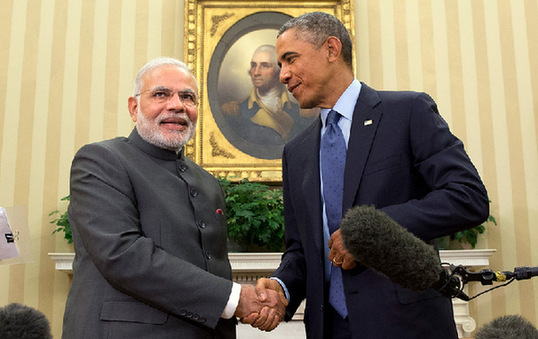Obama's India visit
- By Sumantra Maitra
 0 Comment(s)
0 Comment(s) Print
Print E-mail China.org.cn, January 25, 2015
E-mail China.org.cn, January 25, 2015
|
|
|
U.S. President Barack Obama is the chief guest this time at the Republic Day of India parade in New Delhi on Jan. 26. |
U.S. President Barack Obama is the chief guest this time at the Republic Day of India parade in New Delhi on Jan. 26. This is Obama's second visit to India. This visit is high on symbolism and comes at a precarious time for Obama, whose stature as U.S. president and approval rating is quite low. Obama is at the end of his second term, with an eye on the general elections coming next year, while he is trying to define his legacy and guarantee a Democrat election victory. Obama is not a foreign policy president; in fact he can be described at best as a detached and mediocre student of foreign policy. His legacy would for all practical purposes be solely based on domestic policies like healthcare and immigration reform. In foreign policy, he will be defined by his misjudgments on Iraq troops, the rise of ISIS in Syria and the Russian "reset." However, the next general election is definitely going to be grueling on foreign policy debates, so here's an opportunity for Obama to cement some late scores.
What to expect from this visit then? Not much, to be frank, even though there is a great chance of some "groundbreaking results." As previously mentioned, this visit is high on symbolism. A U.S. president visiting India twice, during his tenure, especially to see a Soviet style and influenced military parade on a Republic Day proves how many times the world has rotated on its axis since the Cold War. Apart from that, the U.S.-India relationship will be stuck in hyperboles that have defined the ties between the two countries.
The United States promised to help India to build three self-sustainable and technologically advanced smart cities, so we might see some progress on the development front. In particular, cities like Ajmer and Vizag might get some boost. Areas like garbage management, solid waste disposal and traffic and internet access might be where U.S. and Indian officials will have further discussions. But the expectations are low, as the results are not immediately tangible.
In defense a major boost is expected. The United States is already one of the top three defense partners, and is keen to overtake Russia in the field. Both the United States and India are willing to increase knowledge transfer, technology transfer, joint research, and the development and production of weapons systems like the jointly developed Indo-Russian Brahmos missile system. Talks of starting a National Defense University in India with American help are also underway.







Go to Forum >>0 Comment(s)